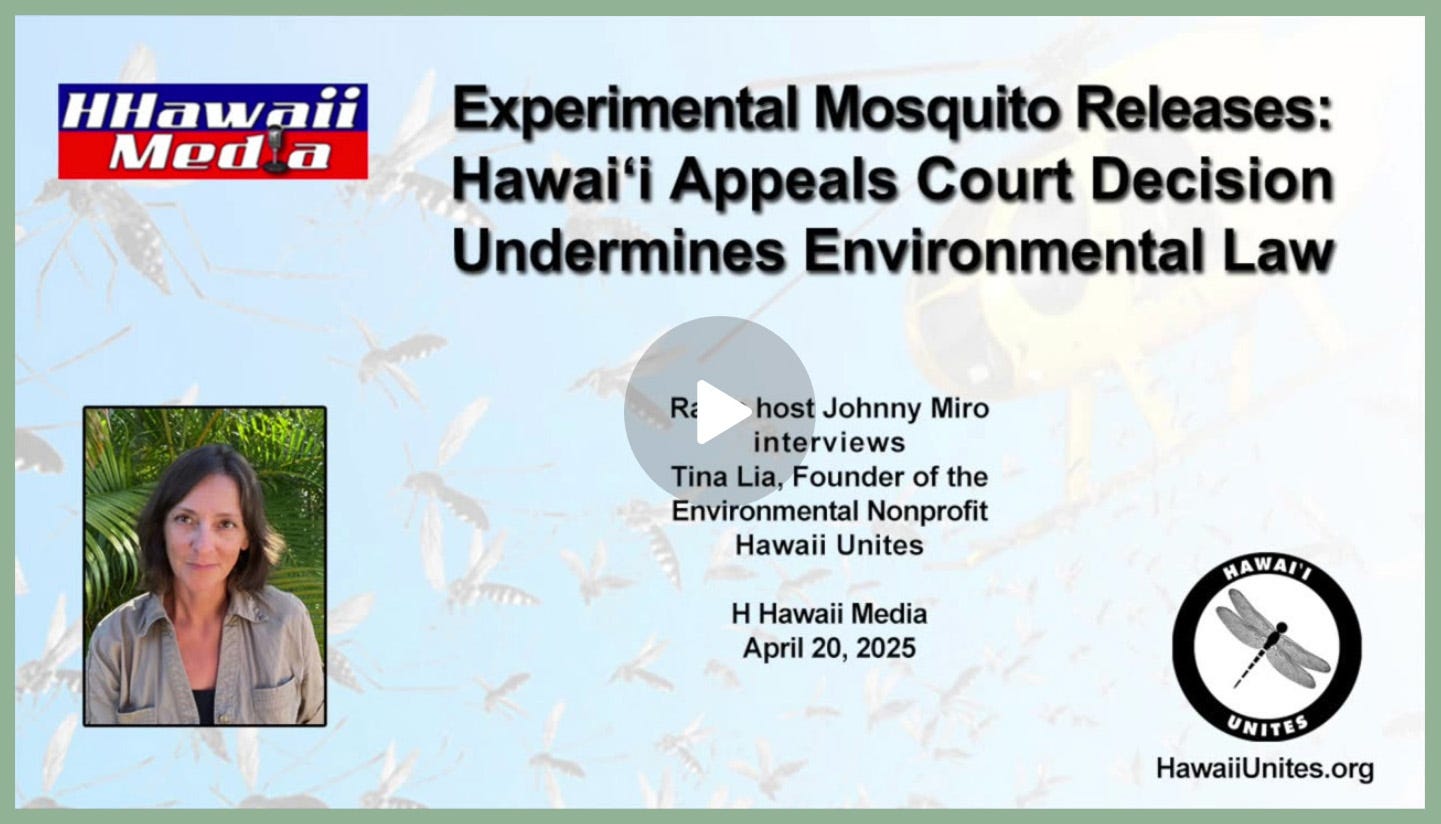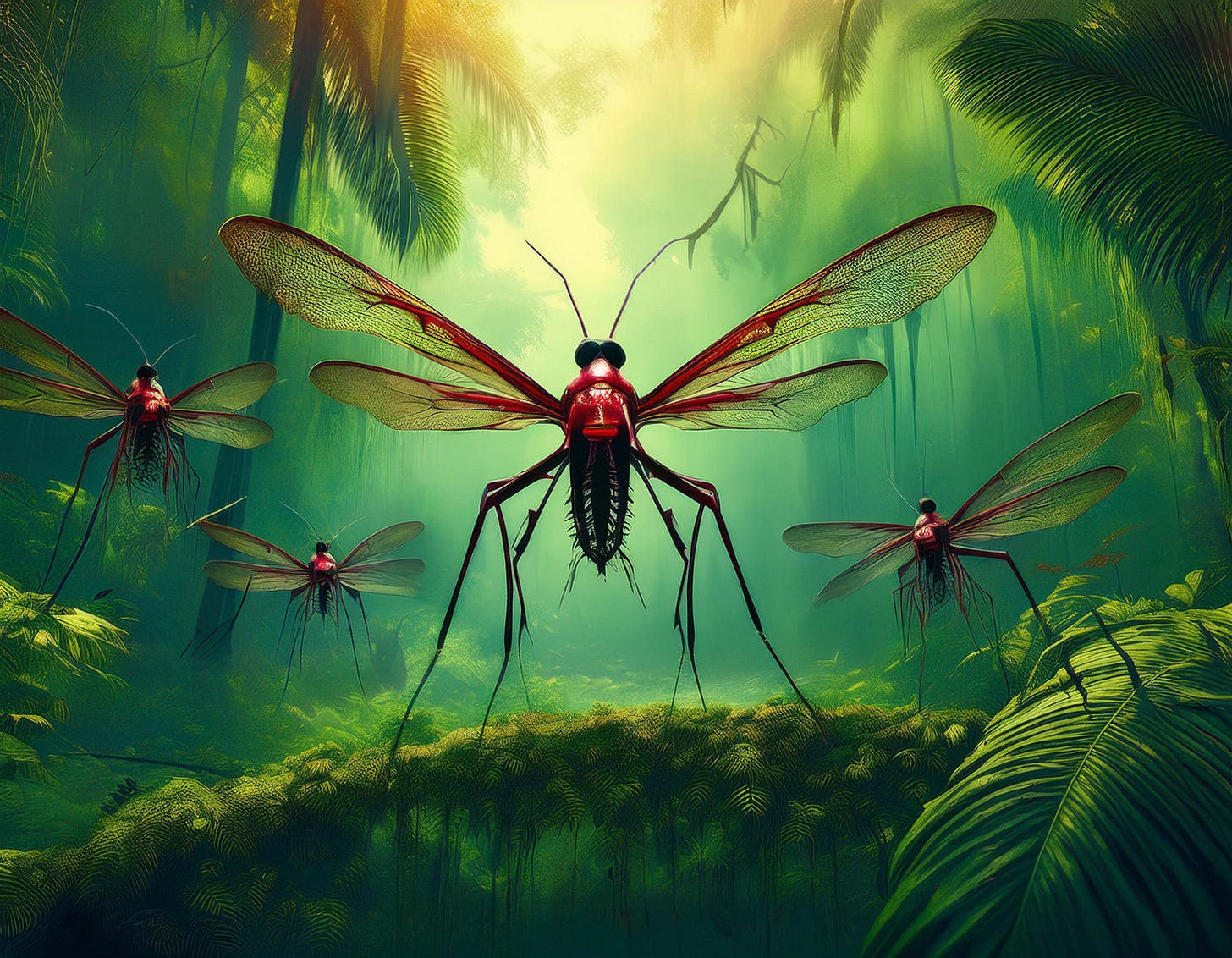Oppose Mosquito Releases in Hawai‘i’s 2025 State Wildlife Action Plan
Protect native birds and the ‘āina by speaking out against these dangerous experimental mosquitoes
The State of Hawai‘i Department of Land and Natural Resources (DLNR) has invited the community to help shape the 2025 State Wildlife Action Plan (SWAP), a “conservation strategy for over 10,000 native species and their ecosystems.” With native birds identified as “Species of Greatest Conservation Need,” the plan will include focus on the threat of mosquito-borne avian malaria. If the DLNR intends to allow for meaningful discussion during the public review process, two upcoming meetings may offer an opportunity to speak out against the mass release of experimental bacteria-infected mosquitoes and to encourage more environmentally sound approaches to conservation that don’t further endanger the native birds and other native species in the project areas.
According to the DLNR, two Zoom meetings will be open to the public on Tuesday, April 29, 2025:
“Community input is sought to guide wildlife conservation statewide. The DLNR Divisions of Aquatic Resources (DAR) and Forestry and Wildlife (DOFAW) invite the public to review the 2025 State Wildlife Action Plan (SWAP). This review process is an opportunity for residents, conservation partners, and other stakeholders to share their views on conservation priorities for Hawaiʻi’s unique native wildlife and habitats.
The SWAP is a comprehensive statewide framework for conserving species and habitats. Updated every 10 years, the SWAP identifies ‘Species of Greatest Conservation Need’ and outlines voluntary, proactive strategies for protection and restoration.
‘We want to hear from everyone – whether you’re a researcher, educator, cultural practitioner, landowner, or just someone who cares about Hawaiʻi’s native wildlife,’ said Maya Goodoni, DAR watershed management specialist. ‘Your insights help ensure the SWAP reflects what matters most to the people and ecosystems of Hawaiʻi.’
The public review will include an overview of the SWAP process, highlight key updates for 2025, and provide space for public questions and feedback.
The SWAP plays a key role in securing federal funding through the State and Tribal Wildlife Grants Program and supports collaborative conservation efforts across the Hawaiian Islands.
The public review will take place virtually via Zoom. Two meeting times, one in the morning and one in the evening, will present the same information.
Meeting details:
Date: Tuesday, April 29, 2025
Times:
AM Session: 10:00 a.m. – 11:00 a.m.
PM Session: 5:00 p.m. – 6:00 p.m.Join Zoom Meeting: https://hawaii.zoom.us/j/83526168265
Meeting ID: 835 2616 8265
Passcode: 864652
Help us shape the future of wildlife conservation in Hawaiʻi. Join the conversation and share your manaʻo.”
Endangered and threatened native birds need our protection, along with all of the unique native species in Hawai‘i’s conservation areas. The DLNR’s current strategy of releasing millions of novel Wolbachia-bacteria-infected mosquitoes into our fragile ecosystems on Maui and Kaua‘i is not the answer. These invasive lab-altered mosquitoes have not been sufficiently studied, and this massive biotech experiment could backfire and cause serious harm to the native birds and to all life in the natural habitat areas where the releases are occurring. Please stand up for the health of the honeycreeper forest birds targeted by this agenda and for the health of these islands. Let the DLNR know that we oppose these mosquito releases. Encourage alternatives that don’t turn sacred lands into testing grounds for dangerous, irreversible experiments. Share Hawai‘i Unites’ message:
“Please protect Hawai‘i’s endangered and threatened native birds and all native species in the honeycreepers’ natural habitats. Stop the release of experimental bacteria-infected mosquitoes on Maui and Kaua‘i. Conservation efforts and funding must focus on more environmentally sound approaches like habitat and stream flow restoration, which would honor the ‘āina, the culture, and the ancestral connections of the native birds rather than putting Hawai‘i’s native species at further risk of extinction.”
For more details on the risks of these mosquito releases, please see Hawai‘i Unites’ most recent testimony to the Board of Land and Natural Resources.
Last week, I spoke with H Hawai‘i Media’s Johnny Miro about the State of Hawai‘i Intermediate Court of Appeals (ICA) decision in Hawai‘i Unites’ case to stop experimental bacteria-infected mosquito releases on Maui. The ICA’s decision to allow these mosquito releases to move forward with no studies of the potential significant impacts sets a damaging precedent. Our environmental laws are undermined when agencies can get away with a lower standard of review for massive projects like this that can have harmful consequences that may affect the health of our islands’ people, ‘āina, and wildlife.

Hawai‘i Unites is working with our attorneys to review our options for taking this case to the Supreme Court of the State of Hawai‘i. We will have an update in the weeks ahead as we continue speaking out about the risks of these dangerous mosquito releases while researching and documenting the actions of the agencies involved.
Mahalo for standing with us in protecting our environment and natural resources. Your tax-deductible donations help us move forward with our mission.
Aloha,
Tina Lia
Founder
Hawai‘i Unites
HawaiiUnites.org
Hawai‘i Unites is a 501(c)(3) nonprofit organization dedicated to the conservation and protection of our environment and natural resources. Your tax-deductible donations help us to fulfill our mission of honoring and protecting our sacred connection to the natural world.
Report a Mosquito Bite
The State of Hawai‘i and its multi-agency partnership Birds, Not Mosquitoes have been releasing bacteria-infected mosquitoes in East Maui and conducting pilot study releases on Kaua‘i since 2023. As part of our ongoing research and documentation, Hawai‘i Unites has been compiling reports from throughout the islands about unusual mosquito bite reactions. If you’ve been bitten by a mosquito and would like to report the incident, please complete our Mosquito Bite Incident Report.




